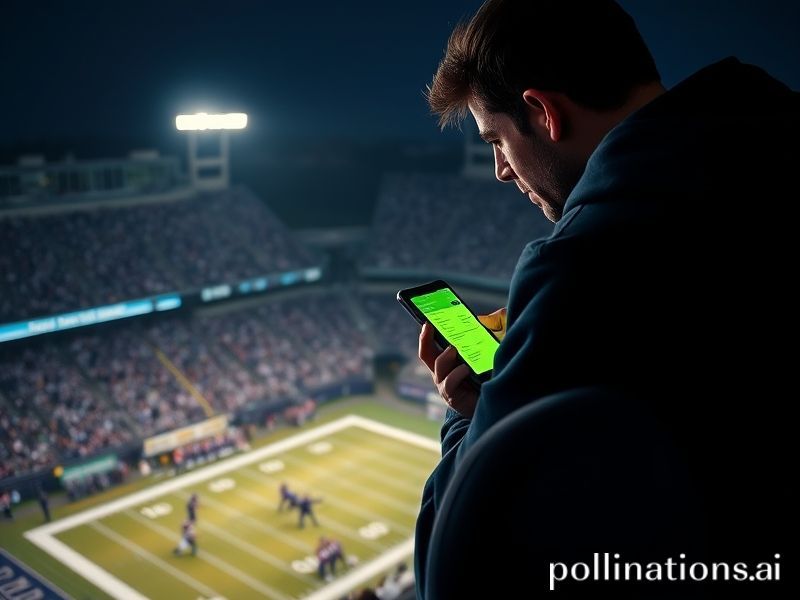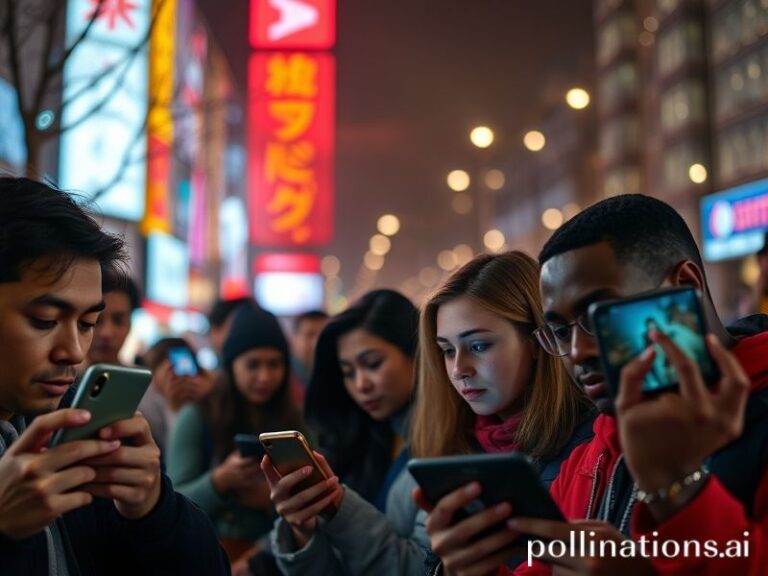fanduel
FanDuel and the Great Global Gamble: How One App Turned Every Human Into a Bookie
By Dave’s International Affairs Desk (currently 3-1 on whether the editor reads this)
If you squint at the planet from orbit, you can almost see the faint green glow of FanDuel pulsing from every sports bar, commuter train, and questionable Wi-Fi connection between Reykjavik and Rio. What began as a scrappy daily-fantasy startup in Edinburgh—yes, Edinburgh, land of whisky, bagpipes, and apparently venture capital—has metastasized into a transatlantic dopamine pump now headquartered in New York and licensed from Colorado to Canberra. In other words, humanity’s newest addiction wears a hoodie, speaks fluent legalese, and pays taxes in multiple jurisdictions. Progress marches on.
The premise is elegant in its cynicism: why bet on a season-long league when you can cram the same serotonin hit into three hours and a parlay? FanDuel distilled the entire sporting calendar into a slot machine with a leaderboard. Soccer moms in Ohio and oil-rig roughnecks off the coast of Angola now share the same existential question: “Will the Bengals cover?” Somewhere, a Bolivian alpaca farmer is refreshing live odds on an NBA third-quarter spread because, thanks to a satellite uplink and lax KYC rules, the entire planet is now one degenerate poker table—except the house always has better Wi-Fi.
Globally, regulators have responded with the grace of a drunk trying to parallel park. The UK classifies FanDuel’s products as “pool betting,” which sounds quaint, like something involving rubber ducks. Australia calls it “wagering,” which is at least honest: you’re wagering your rent. Meanwhile, U.S. states are engaged in a 50-front civil war over whether a same-game parlay is skill, luck, or witchcraft. Canada just shrugged and legalized single-event betting last year, presumably because it was tired of pretending its citizens weren’t already firing CAD into offshore sites from igloos. The European Union, bless its bureaucratic heart, is drafting a Digital Services Act annex specifically to declare FanDuel’s push notifications “dark patterns,” which is Brussels-speak for “we don’t like fun.”
The macroeconomic implications are deliciously absurd. Entire Caribbean economies now balance on whether FanDuel’s servers stay up during March Madness. The Philippine peso wobbles every time a prop bet on Joel Embiid’s rebounds goes viral on TikTok. And in a plot twist that would make Adam Smith weep into his invisible hand, Argentina’s central bank briefly considered adding “fantasy sports tax receipts” to its foreign-reserves forecast—right next to soybeans and desperation.
Humanity’s response has been predictably on-brand. British MPs fret about “gambling-related harm” while wearing ties bought with donations from betting conglomerates. Indian influencers hawk promo codes in between Ayurvedic tea ads. And in Nigeria, where youth unemployment hovers around 33 %, Telegram channels teach “arbitrage strategies” using FanDuel’s pricing errors—because nothing says economic development quite like exploiting American algorithmic hiccups from Lagos.
The cultural fallout is even richer. In pubs from Galway to Guangzhou, conversation has devolved into a string of acronyms: “I took the ATL Hawks ALT points under, hedged with Luka triple-double insurance, and now I owe my cat rent.” Friendship has been redefined as “someone who will cash you out on Venmo before kickoff.” And somewhere in Finland, a sauna full of stoics is discussing whether FanDuel’s same-game parlay void rules violate basic Nordic fairness—while simultaneously sweating out last night’s losses.
Which brings us to the inevitable question: Is this the apex of late-stage capitalism or merely the logical endpoint of a species that invented agriculture just to have something to bet on? FanDuel hasn’t created new vices; it has simply optimized the old ones for 5G. The app is just a mirror, albeit one that charges a 10 % hold and sends push alerts at 3 a.m. when the Australian Open gets spicy.
Conclusion: In the end, FanDuel is less a company and more a planetary confession booth where we admit that tribalism, hope, and the need to feel something—anything—can be monetized at $5 increments. The house always wins, yes, but so does humanity’s boundless talent for self-delusion. And if that isn’t worth a live bet on the next civilization, I don’t know what is. Check the odds—they’re probably +350 and juiced to the moon.







